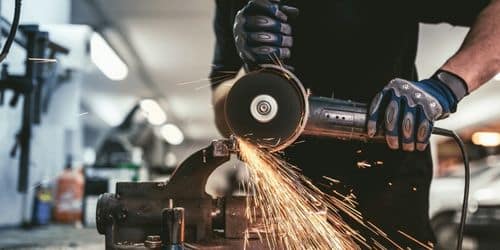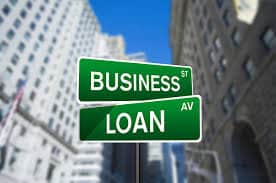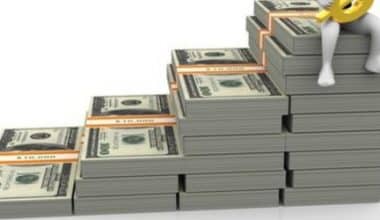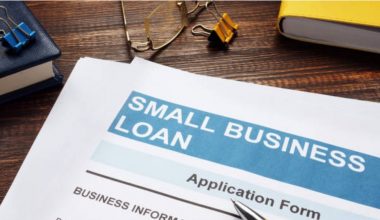The average interest rates for a loan to buy equipment for a small business depend on the type of lender, the type of loan, and whether the interest rate is fixed or changes over time. Getting the right loan for your small business equipment depends on several things, like what you want to use it for, how long you’ve been in business, how much money you make, your credit score, and the type of lender you work with. Remember that the loan that looks the cheapest upfront may not always be the case. Think about the loan from all angles, paying close attention to the interest, fees, length, and any penalties for paying early.
Small Business Equipment Loan
Depending on your eligibility, credit score, and needs, a small business equipment loan can be obtained from various sources. Here are our recommendations for the best sites to get a small business equipment loan.
#1. National Funding
National Funding may be worth looking into if you need an equipment loan but have less-than-perfect credit. Borrowers have several months before making their first payment, and you can finance new or used equipment.
Pros
- Requirement for a low minimum credit score
- There are no payments required for the first three months.
Cons
- Funding may take up to three business days to arrive.
- There is no down payment required; however, this may result in a larger monthly payment because you are borrowing more.
#2. Commercial Fleet Financing
Commercial Fleet Financing specializes in commercial transportation equipment, such as trucks and trailers, if you need a small business equipment loan for commercial vehicles. If a business owner has good credit, they may be able to get cash in as little as 24 hours.
Pros
- Perfect for business owners that require commercial transportation.
- Open to entrepreneurs with a significant down payment
Cons
- Requirement for a high minimum credit score
- Inadequate clarity regarding average interest rates
#3. Taycor Financial
Taycor Financial may be appealing to new businesses because the lender may be willing to let them rent or buy their first pieces of equipment. Borrowing restrictions are large, yet interest rates might be pretty high.
Pros
- There is no requirement for a certain amount of time in business.
- A lower credit score may not be an issue.
Cons
- Interest rates could reach double digits.
- A more extended loan period may result in higher interest payments over time.
#4. CIT
The considerable borrowing limitations of CIT’s equipment finance set it apart. A qualified business owner could get up to $500,000 in funding in just one business day.
Pros
- Qualified borrowers may be approved for up to $500,000 in loans.
- Interest rates may fall as low as 5.49%.
Cons
- Startups must have been in business for at least two years.
- Unsuitable for business owners with poor credit.
Unlike bigger general-purpose small business equipment loans, equipment loans can occasionally be for lesser sums, making them slightly easier to get.
Loans Intended Specifically for Equipment
An equipment loan can be used to buy almost any physical asset a small business needs to run, such as computers, restaurant equipment, and machine tools. For example, if your restaurant needs a new pizza oven, getting an equipment loan could give you more ways to pay for it.
Traditional lenders like banks and credit unions offer equipment loans. Non-bank financing businesses and online lenders also offer equipment loans.
An SBA 504 loan may be an option if you need extensive and expensive equipment, such as a front-end loader or road grader used by a construction company.
The terms of commercial bank and credit union equipment loans will vary based on the lender. Commercial loan payback terms might be a fixed or variable rate, with a maximum repayment length of seven years for most commercial loans. Interest rates vary based on the bank, your credit, and the amount borrowed, but the majority fall between 6 and 12 percent.
Small Business Equipment Loan Interest Rates
Small business equipment loan interest rates range from 3% with a regular bank to 150% with alternative lenders. SBA 7(a) loans, now one of the cheapest business loan products available, have rates ranging from 6% to 8%.
Average Business Loan Interest Rate
The average small business equipment loan interest rates are tough to pinpoint. Because so many different lending institutions offer a wide range of small business loan rates and express these rates in so many different ways, it’s challenging to establish the average business loan interest rate.
With small business equipment loan interest rates ranging from 3% (the best rate small business banks may provide) to 150% (which certain cash advance businesses can charge), it’s reasonable to say that the average falls somewhere in the middle.
Interest Rates by Loan Type
Even though business loan rates can change based on several factors, they usually fall within a specific range for each loan product.
Generally, more traditional, longer-term goods, such as bank loans and SBA loans, will have the lowest interest rates. In contrast, alternative products, such as merchant cash advances and short-term loans from internet lenders, will be more expensive.
Of course, average business loan interest rates will vary depending on your qualifications. The stronger your company’s qualifications, the better your chances of receiving lower rates.
Rates by Lender
Interest rates on your small business equipment loan will vary depending on the type of product as well as the lender you’re working with. Traditional lenders, like banks, will once again be able to offer the best rates, but they will also be the most difficult to work with and take the longest.
Other Factors Influencing Small Business Equipment Loan Interest Rates
Aside from the type of loan you choose, your business history and borrower profile will also influence the interest rate you’ll pay.
#1. Credit history
Most small business lenders will consider your personal and business credit scores during the loan application process. Lenders want to know that you can pay off your other personal or business debts on time.
Most lenders have minimum credit score requirements to qualify for their loan products. Banks may want FICO credit scores of 680 or higher, but other lenders may be willing to work with scores as low as 500. The interest rate you get will depend on your credit score, with higher scores often getting you lower rates.
#2. Business financials
Lenders will look at your current and planned business finances as part of the application process. Most lenders have minimum requirements for how long you’ve been in business and how much your business makes each year. Even though exact cash flow or profit requirements are less common, you should be ready to show the correct paperwork if asked. You’ll also need to show how you intend to use the loan profits and how the cash will help the business in the long run, which should be detailed in your business plan and strategy.
#3. Relationship between lenders
Your relationship with the lender is another aspect that influences your interest rate. Some lenders may provide lower interest rates or lesser fees to applicants who have a deposit account with the organization or have previously taken out loans. This is true for banks and alternative lenders, so consolidating your borrowing and banking may be a good option.
How Do you Get a Small Business Equipment Loan?
As with any business loan, you should have your paperwork ready. Having a clear business strategy that shows why you need the equipment and how the purchase will propel your business forward is beneficial.
Cash flow for your business will also need to be shown by profit and loss statements. You should also bring a copy of your resume to show that you have experience in the business. Some collateral will be required to guarantee the loan, but in most circumstances, the equipment itself can be part of or all of the collateral.
Leasing Equipment
If the equipment you require will become obsolete and/or needs to be replaced quickly, leasing it may be better than taking out a loan. It’s also a terrific way to get the equipment you want to keep once the lease ends. Lease payments are frequently lower than loan payments, and some end-of-lease buyouts are as little as $1.
Which Equipment Should You Lease?
The following are some instances of equipment that may be better suited for leasing rather than purchasing:
- High tech computers
- Software
- Medical equipment
- Any equipment that is subjected to a lot of wear and tear
Remember that most leasing agreements allow you to buy the equipment at the end of the contract.
Pros of Leasing
It can be easier to get a lease than an equipment loan, and the terms can be more flexible. Some leases are frequently available with no down payment. Also, if you are leasing equipment that needs to be updated often, you may be able to include terms in the lease that let you trade the equipment in for an upgrade after a certain amount of time.
In addition, unlike loan interest, the total amount of a lease payment is tax deductible. But keep in mind that if you want to write off your payment as a business expense, you must lease the whole thing and not be able to keep it at the end of the lease.
Cons of Leasing
While leasing can give you a way to receive the necessary equipment while freeing up funds for other needs, in some cases, leasing can cost more than a loan. For example, if you decide you no longer require the equipment after a year and your lease is for two years or more, you will almost certainly be required to continue making payments.
What equipment can be financed?
Business owners can get loans to pay for cars, computers, kitchen appliances, commercial office supplies, and other equipment. Many industries can benefit from equipment loans.
What is the interest rate on an equipment loan?
Interest rates on equipment loans often range between 2% and 20%. While the range is as broad as the tractor you’re financing, it’s because your credit score and length of business heavily influence the rate you obtain.
Is an equipment loan a bank loan?
A loan used to purchase business-related equipment, such as a restaurant oven, automobile, or copy machine, is referred to as “equipment finance.” When you take out an equipment loan, you must make monthly payments that include interest and principal over a set period.
What is an equipment term loan?
A long-term financing option with fixed or variable interest rates that allows you to buy equipment without sacrificing short-term cash flow. The borrower owns the equipment free and clear after the loan is paid in full.
Is it hard to get an equipment loan?
Equipment loans may be less challenging to obtain than other small-business loans. Because the equipment you buy serves as security for the loan, you may not have to rely on other criteria, such as personal credit or time in business, to qualify.
What credit score is needed for an equipment loan?
550
Down payments: Large down payments (usually up to 20%) may be required for equipment loans. Credit score requirements: Typically, the minimum credit score required is 550.
Is equipment financing a good idea?
Financing equipment is a fantastic choice because it provides rapid access to cash, allowing you to get your business up and running.
Is it better to take a loan to buy equipment?
One important reason to finance the equipment is that it creates long-term business credit even if you have the funds to complete the purchase. There may come a time when you don’t have enough money to buy the necessary tools or software.
How much equipment loan can I get?
Loan amounts typically vary from $10,000 to $500,000, with interest rates ranging from 6% to 9% and durations ranging from two to seven years. Borrowers should plan on putting down 5% to 20% on a home.
Conclusion
One of the most important considerations when considering the best approach to financing equipment is whether to take out a small business loan or lease what you need. Each option has its benefits, but the key is to look at your situation and decide based on how quickly you need cash, how you plan to use that money for investments or needs other than equipment, and how long the equipment will last.
Related Articles
- HOW DOES LEASING A CAR WORK? Detailed Guide
- EQUIPMENT LEASING: Benefits, Types, Costs & Complete Guide
- BUSINESS LOAN FOR EQUIPMENT: How To Get Business Loans For Equipment
- WHY LEASE A CAR? Pros and Cons Explained
- BEST TIME OF THE YEAR TO LEASE A CAR: A Complete New Year Guide






